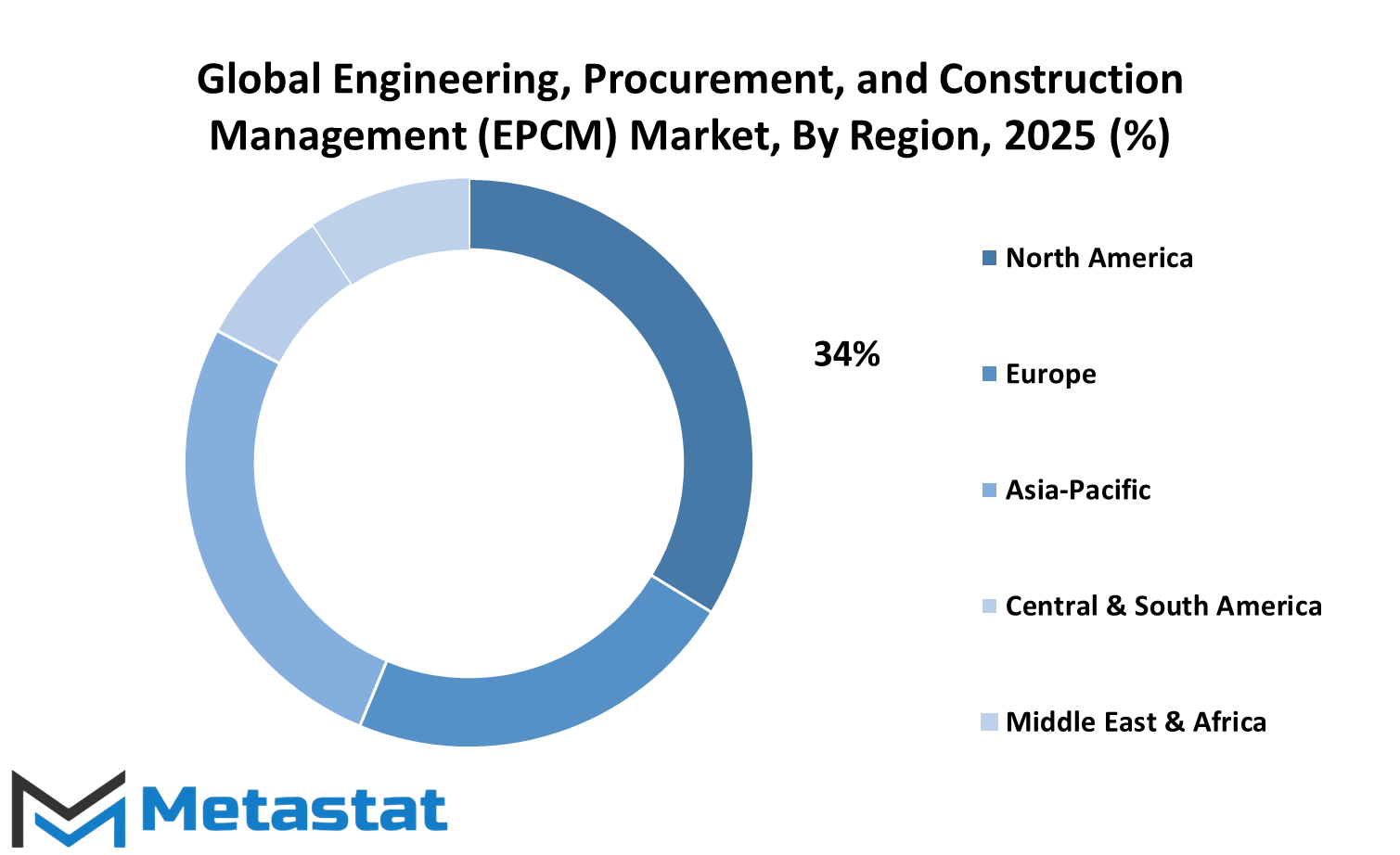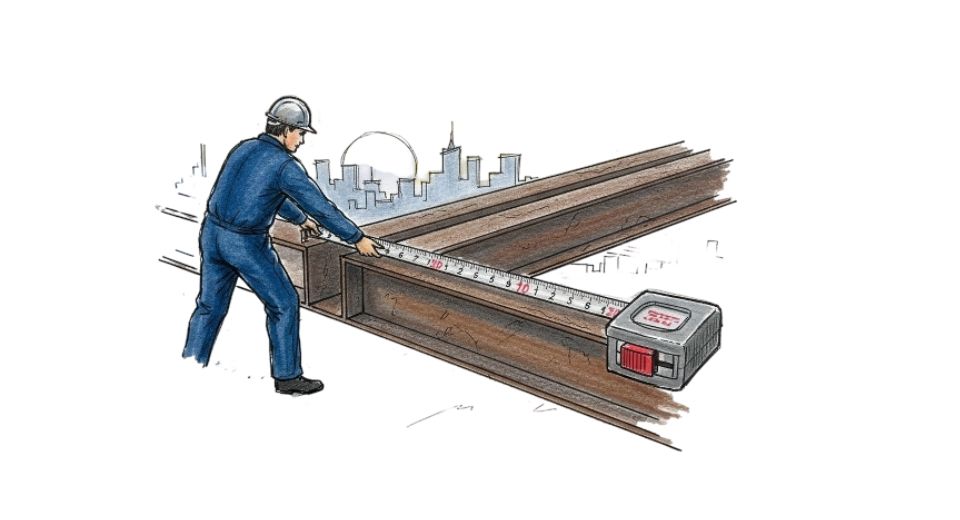MARKET OVERVIEW
The global engineering, procurement, and construction management (EPCM) market is a pillar of megaprojects and large-scale infrastructure development and industrial projects and is a coherent framework that oversees intricate projects in different industries. It concentrates on providing integrated solutions with detailed planning, resource procurement, and construction process coordination to ensure that the projects are completed in an efficient and smooth manner. EPCM operates in the fields of energy, transportation, manufacturing, and healthcare to ensure that high-value projects are completed effectively, accurately, professionally, and with strong coordination. The EPCM market can be categorized internationally by the combined character used where the technical as well as the administrative aspects of delivering a project are combined together.
This engineering-based process involves precise designing of the structures and system to the client's requirements. Procurement is one of the sources of securing equipment and materials prior to the agreed-upon time, via a global supply chain through solving quality and schedule requirement problems. Construction management is the final pillar, and there is physical implementation of a project with contractors to manage and time and budget to consider desired results. This harmonious interworking of these components is what gives EPCM as an efficient and trusted one, separating this from other project delivery models. This scope of the global engineering, procurement, and construction management (EPCM) market is expansive beyond the general bounds of construction and engineering services. It plays an extremely crucial role in propelling innovation, sustainability, and productivity in contemporary infrastructure development projects.
For instance, the uptake of advanced technologies like BIM, modular construction methods, and digital twins has transformed the way projects are envisioned and carried out. All these innovations will have their spot in enhancing accuracy and reducing the project timeline, making the EPCM model invaluable to tackle contemporary infrastructure needs. Also, the global engineering, procurement, and construction management (EPCM) market will evolve in the sense of establishing sustainable developments. With their efforts to reduce their presence in the world and achieve sustainable results, EPCMs will look forward to employing greener materials, sustainable resources that also introduce effective waste management methods in such projects. All these revolutions of sustainability will change the amount of standard output levels that are related to executions in every project and further reveal the market in new industries revolving around renewable energy and green infrastructural operations.
By these means, the global engineering, procurement, and construction management (EPCM) market demand of its magnitude would be greater for the capability to remain flexible since it works with projects of diversity in terms of complexity and size, with EPCM companies' being adjustable according to needs. And thereby elevating this to a step higher than small-scale urban development in terms of large industrial complexes and providing the services. The capacity to evolve in response to different challenges and the dedication to innovation will serve to strengthen the position of the market as a necessary facilitator of infrastructure advancement in the years to come.
Global engineering, procurement, and construction management (EPCM) market is estimated to reach $10,325.52 Million by 2032; growing at a CAGR of 9.7% from 2025 to 2032.

GROWTH FACTORS
The global engineering, procurement, and construction management (EPCM) market is poised to witness high growth due to the increasing need for massive infrastructure projects in the energy, transport, and industrial sectors. The growing demand reflects the increased desire for more efficient connectivity, power sources of high value, and sophisticated industrial facilities to support economic growth and modernization all over the world. With nations competing to address the issues of urbanization and growth, the market for EPCM is poised to be at the forefront of completing these projects effectively and efficiently. One of the key drivers for this expansion is the growing emphasis on environmentally friendly construction practices.
As international concern about the environment has never been higher, there is a heavy focus on saving on resource wastage, lowering carbon emissions, and producing environmentally friendly designs for construction projects. This trend fits into wider social objectives for sustainability and keeps EPCM practices up-to-date and forward-looking. By incorporating efficient use of resources into project management, businesses are not only working to mitigate environmental issues but are also complying with stricter regulations and customer expectations. Nevertheless, the EPCM industry has some challenges that might influence its growth curve. For instance, excessive initial investment in planning and resource commitment might discourage small clients who do not have the financial capability to participate in such massive ventures.
In addition, complying with various local, national, and international regulations is a sophisticated process that tends to cause inconsistencies in the project schedule. These regulatory barriers are challenging to overcome since they possess in-depth knowledge regarding legal frameworks as well as cultural nuances that might not be short in time and money. The optimism is strong for the rise of global engineering, procurement, and construction management (EPCM) market in the coming years. With AI, BIM, and the Internet of Things, project efficiencies would rise and monitoring could be real-time. These technologies have the potential to automate processes, minimize errors, and maximize resource efficiency, thus enhancing the overall project results.
For example, AI can forecast possible risks in a project, BIM can create detailed visualizations for improved planning, and IoT can provide uninterrupted communication among different aspects of a project. While the Global EPCM market has tremendous growth potential, overcoming its financial and regulatory obstacles will enable the market to sustain long-term growth. The embrace of innovative technologies holds the promise of opening up new opportunities and ensuring that this market remains adaptive and resilient in an ever more complex and demanding world.
MARKET SEGMENTATION
By Type
The global engineering, procurement, and construction management (EPCM) market has acquired its momentum in step-by-step but progressive terms. All such industries need solutions where an efficient, integrated solution has the answer to be extremely cost-effective in managing such complex projects. The reach extends to various types of industries that fall under the energy and infrastructural domain and even a manufacturing company that utilized such services coupled with a convergence of an engineering, procurement, and construction management with the same covering umbrella and guarantees the success of accurate execution on budget and timeliness of their projects. This model has become more popular because it can tackle complex problems and provide adequate resource use and risk mitigation. The market has been split into three major services: engineering, procurement, and construction management. Engineering services involve designing and planning.
They offer customized solutions to the project's unique needs. Procurement services involve buying materials, equipment, and services in order to provide quality and cost-effectiveness. Construction management services coordinate the overall implementation phase to ensure that each move is in coordination with the proposed aims. All these are essential building blocks of a successful project, and incorporation into the EPCM service model will be a strategic decision for firms. The global engineering, procurement, and construction management (EPCM) market is bright, led by technological development and rising sustainable practices. As industries embrace digitalization at a fast pace, the application of technologies such as artificial intelligence, robotics, and analytics will transform the market. Not only that, but accuracy, delays, and allocation of resources will also be enhanced. Besides, the shift towards sustainability and green energy projects would likely see an escalation in demand for EPCM services.
Renewable energy projects such as solar and wind farms would require experience in engineering, procurement, and construction management to be more feasible for long-term survival since they have to adhere to stringent environmental requirements. With further growth in globalization and urbanization, the Global EPCM market will continue to be crucial to the fulfillment of the high demand for mega-sized infrastructure and industrial projects. It will remain applicable and on the increase in the future as it continues to remain responsive to the prevailing trends and creative solutions that emerge in the business. This industry is poised perfectly to shape the future of project management and delivery globally by responding to the dynamic requirements of various industries.
By Contract Type
With technological advancements propelling its growth, a change in needs for the projects, and an increase in the complexity of the infrastructure needs worldwide, the Global Engineering, Procurement, and Construction Management market is anticipated to increase tremendously. Demand for EPCM is on the rise in all businesses and governments as contemporary infrastructure for the improvement of all is sought. This global engineering, procurement, and construction management (EPCM) market is divided into various types of contracts, and each one provides distinctive benefits suited to the requirements of a specific project.
These contracts serve an important purpose in determining how projects are executed, providing flexibility with cost and risk management. Lump Sum Turnkey contracts are usually preferred for projects requiring a single point of responsibility. With this form of structure, the contractor takes complete responsibility for the project end to end, providing a finished facility within a set cost. This is the most attractive form of contract for clients as it offers cost certainty and is, therefore, very much sought after for big projects. It requires clear planning and strong execution, however, to prevent last-minute problems.
More demand for cost predictability is also likely to increase the demand for this form of contract in the future. Cost Plus Fee contracts are also a versatile type of contract with room for adjustment for real costs. This, in turn, promotes cooperation between customers and contractors, which will result in creative solutions as problems crop up during the course of the project. It is well suited to projects with undefined scopes or specifications that keep changing. That flexibility is bound to experience increased use as companies seek the means to cope with fluid project needs during this age of fast-paced technological change. Guaranteed Maximum Price contracts strike a balancing act of risk allocation and cost savings.
Because this form of contract encompasses a ceiling price, it provides protection to clients while motivating contractors to remain productive. It has been used more and more in budget-conscious projects. Likewise, Unit Price Contracts emphasize the predetermined costs for specified units of work so that it is clear and predictable, particularly for repetitive work or materials-heavy projects. Time and Materials Contracts provide immense flexibility for projects whose outlines are indeterminate or evolving. This kind of contract is extremely applicable in the global engineering, procurement, and construction management (EPCM) market, whereby innovation and flexibility are the foundations. Contractors shall be remunerated according to time consumed and materials utilized, thereby having the potential to react promptly to unexpected issues. With the Global EPCM market continuously evolving, the diverse mix of contract types will continue to propel it forward and future proofed. In responding to the diverse requirements of infrastructure projects, it is still the critical piece of development that the market will continue to grow, and this growth would define the new face of the construction industry, which, in the next few years, would be characterized by the convergence of collaboration and innovation.
By Project Size
This market will exhibit remarkable growth in the years to come ahead as it plays a vital role in the smooth execution of intricate projects for all industries. The global engineering, procurement, and construction management (EPCM) market is also classified based on project size. It is classified into two types of project size that include small-scale undertakings and large-scale undertakings. These have a sole function of creating infrastructure and industrial elements in every nation across the globe.
The future of this vibrant market is promising and optimistic with changing needs from different sectors. Small-scale projects within the Global EPCM market tend to be region-based to address the needs of the population or enhance existing systems. The projects are centered on efficiency, fast implementation, and cost-effective solutions.
With advancing technology, it is expected that smaller projects will be supported with better tools for design and construction that will speed up the processes and save on costs. Modular construction methods and digital project management platforms are going to make small-scale projects more sustainable and efficient. Medium-scale projects balance the complexity with resource allocation. These projects are significant as they usually involve regional developments. Medium-scale projects comprise medium-size manufacturing plants, energy distribution, and mid-size transportation systems. Investments in renewable power, smart infrastructure, and urban development will influence the future of medium-scale projects for the Global EPCM market.
The future will be green as a result of environmental issues by the government and private industries. Medium-sized projects will thus be concerned with more environment-friendly building practices and new materials which cause less environmental degradation but have longer lifespans. Large projects, however, involve huge investment and influence at the global level. Most large projects involve mega infrastructure such as highway development, airport, or power plants, and huge planning and coordination. The global engineering, procurement, and construction management (EPCM) market for large-scale projects will expand steadily as nations prioritize infrastructure modernization and resilience.
Large-sized projects will, in the future, be implemented primarily with the application of advanced technologies and with the integration of artificial intelligence, robotics, and advanced analytics for better planning and execution efficiency. Greater emphasis on sustainability also generates innovations on the material science and methodology side. The global engineering, procurement, and construction management (EPCM) market would expand with the transformation of industries in how they reacted to differentiated demands and adopted technological advances. The segmentation by project size would also make way for a customized approach towards differentiated needs, opening the way for effective and sustainable growth. Such a market's growth would thus continue to be crucial to influencing the destiny of global infrastructure and industrial development.
By End-Users
The global engineering, procurement, and construction management (EPCM) market is gradually and consistently molding industries globally. The necessity of efficient execution of projects is compelling different end-users to develop appealing solutions as a reaction. Organizations seeking to obtain cost-effective and streamlined solutions for massive projects seek the EPCM model.
The global engineering, procurement, and construction management (EPCM) market is diversified into oil and gas, mining, infrastructure, power and energy, and chemicals, each contributing differently to its growth. Examining these sectors will determine how this market has so much potential for drastic changes, primarily due to future technology and green technologies that can be brought into this market. The market is dominated by oil and gas, with advantages in the form of EPCM having the ability to manage complicated projects when it comes to explorations, production, and refining. Here, perfection is the key, and timely and effective management of timelines and resources is facilitating projects to be delivered successfully. The mining sector is employing EPCM methods where operations are very far and need challenging logistics to render them smooth and eco-friendly compliant. The necessity of sustainable processes and effective extraction techniques in this sector has led to innovation and technology upgradation in the EPCM industry.
Infrastructure projects range from urbanization to transport networks, and these all utilize the EPCM system. With the population increases and urbanization, there is always the constant demand for intelligent cities and higher connectivity.
EPCM services in this sector enable timely project completion and maintaining cost within limits. Power and energy, however, are shifting towards clean energy sources. This transition offers huge prospects for the global engineering, procurement, and construction management (EPCM) market to offer specialized solutions in the solar, wind, and other clean energy projects catering to their complexities. The chemical industry, as niche as it is, plays an important role in fueling the growth of this market because it requires precise planning, regulatory compliance, and safety measures.
The EPCM approach ensures that such projects adhere to industry norms in a way that is cost-effective. Future developments in the industry would seem to be along lines of sustainable materials and processes, which would fuel more innovation within the EPCM market. As technology and sustainability continue to reshape industries, the global engineering, procurement, and construction management (EPCM) market will further contribute to bridging innovative demands with practical solutions. Its flexibility across industries demonstrates how relevant it is in shaping the future, making sure that projects are executed efficiently, precisely, and keeping an eye on innovation.
|
Forecast Period |
2025-2032 |
|
Market Size in 2025 |
$5,515.49 million |
|
Market Size by 2032 |
$10,325.52 Million |
|
Growth Rate from 2025 to 2032 |
9.7% |
|
Base Year |
2024 |
|
Regions Covered |
North America, Europe, Asia-Pacific Green, South America, Middle East & Africa |
REGIONAL ANALYSIS
The global engineering, procurement, and construction management (EPCM) market is growing highly in different regions of the world, and different opportunities and challenges are presented by each region. Geographically, the market is separated into North America, Europe, Asia-Pacific, South America, and the Middle East & Africa, with distinct trends and contributions by each region to the entire industry. Regional analysis indicates how all these regions accommodate the evolving demands of building and engineering construction, highlighting their future prospects. North America is a major market, with the U.S., Canada, and Mexico being crucial drivers. It has a robust infrastructure, with ongoing investment in energy, technology, and industrial sectors. With industries embracing new technologies and sustainable practices, opportunities for EPCM services are expected to increase steadily. All these are again supplemented by renewable energy projects, smart city development, and high supply chain networks.
Europe is another prominent contributor to the global engineering, procurement, and construction management (EPCM) market, with players like the UK, Germany, France, and Italy being key players. Europe's focus on green energy projects and infrastructural upgradation fits in line with the growing requirement for specialty project management services. Moreover, Europe's focus on complying with environmental laws and sustainable targets positions it as the center for cutting-edge engineering solutions. This will seek to encourage more investments in EPCM projects, particularly for transport infrastructure and renewable energy. Asia-Pacific nations such as India, China, Japan, and South Korea are the key drivers of demand for EPCM service because of high industrialization and urbanization in the region. With the growing trend of governments in this region to invest in large-scale infrastructure projects, the need to handle engineering and construction has grown and become more important.
With increasing backing for renewable energy along with significant investments in the smart city and industrial corridor markets, the future looks excellent for EPCMs in this region. Demand drivers increase are supported with qualified labor force as well as more focus on project delivery involving technology. Other expansion opportunities of the global engineering, procurement, and construction management (EPCM) market also emerge in South America and Middle East & Africa.
They include Brazil and Argentina that focus on energy and infrastructure projects; and the GCC nations, Egypt, and South Africa that rely on natural resources for more aggressive construction activities. Given that the said areas would find a means to overcome such issues and keep on enhancing over time, demand for proper and efficient project management service provision would keep on rising. Understanding these regional dynamics, the future of the Global EPCM market is innovation, strategic investment, and devotion to sustainable development.

COMPETITIVE PLAYERS
The global engineering, procurement, and construction management (EPCM) market for engineering, procurement, and construction is expanding with rapid innovation through necessity in attaining such sustainable solutions along with emergences of prospective project needs and technological developments. Such a market would include design, procurement of, and management of substantial construction work in the aforementioned industries-energy, infrastructures, manufacturing among others. Firms working in this area will not only have to deliver projects on schedule and on budget but also have to address very precise environmental and safety concerns. Actors in this area are going to be in key positions in shaping the infrastructures of the future and thus such roles become remarkably significant at a time marked by such phenomenal technological and industrial transformation. Fluor Corporation, Bechtel Corporation, Jacobs Engineering Group, Worley, Samsung Engineering, KBR Inc., Saipem, TechnipFMC, McDermott International Ltd., Petrofac, China State Construction Engineering Corporation (CSCEC), and Hyundai Engineering & Construction are among the leading players in the Global EPCM market.
These players have led the way in project development, particularly through efficiency of innovation. All of which contribute something new to the table such as cutting-edge technology and strong processes used on some of the world's most complicated projects. So their attention isn't all about execution but about how to foresee future demands and design solutions that would facilitate the evolution of urbanization, growing energy needs, and sustainability initiatives. The more vibrant the world gets, the more the EPCM will be driven by digital technology adoption such as Building Information Modeling, Artificial Intelligence, and analytics. All of these will enable more effective decision-making, enhanced resource allocation, and better project outcomes.
The industry rivalry compels the firms to keep on refining procedures so that they do not lose the beat. The companies continue to enhance and supplement their capabilities through strategic alliances and joint ventures with a view to provisioning more holistic and effective solutions on a better scale. Concern for sustainability is also emerging as the principal impetus in the Global EPCM market. Players are increasingly putting emphasis on green building, energy-efficient infrastructure, and renewable power initiatives. This change, thus, complies with the regulatory needs and addresses the increasing demands of stakeholders towards eco-friendly solutions.
Such enterprises keep innovating in a manner that not just are they addressing existing demands but are also paving the path towards a greener and more efficient future. With competition driving the boundaries of innovation and delivery, the global engineering, procurement, and construction management (EPCM) market continues to be a key driver to mold infrastructure and solutions to the challenges of the future.
Engineering, Procurement, and Construction Management (EPCM) Market Key Segments:
By Type
- Engineering Services
- Procurement Services
- Construction Management Services
By Contract Type
- Lump Sum Turnkey
- Cost Plus Fee
- Guaranteed Maximum Price
- Unit Price Contracts
- Time and Materials Contracts
By Project Size
- Small-Scale Projects
- Medium-Scale Projects
- Large-Scale Projects
By End-Users
- Oil & Gas
- Mining
- Infrastructure
- Power & Energy
- Chemical
Key Global Engineering, Procurement, and Construction Management (EPCM) Industry Players
- Fluor Corporation
- Bechtel Corporation
- Jacobs Engineering Group
- Worley
- Samsung Engineering
- KBR Inc.
- Saipem
- TechnipFMC
- McDermott International Ltd.
- Petrofac
- China State Construction Engineering Corporation (CSCEC)
- Hyundai Engineering & Construction
WHAT REPORT PROVIDES
- Full in-depth analysis of the parent Industry
- Important changes in market and its dynamics
- Segmentation details of the market
- Former, on-going, and projected market analysis in terms of volume and value
- Assessment of niche industry developments
- Market share analysis
- Key strategies of major players
- Emerging segments and regional growth potential








 US: +1 3023308252
US: +1 3023308252






